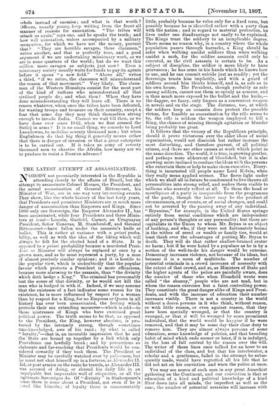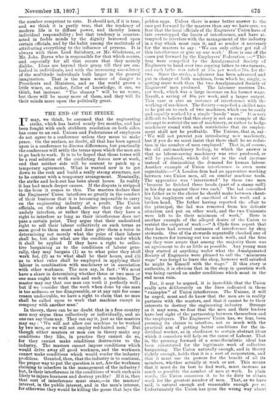THE LATEST ATTEMPT AT ASSASSINATION. N OBODY not pecuniarily interested in
the Republic is attending closely to the affairs of Brazil, but the attempt to assassinate Colonel Moraes, the President, and the actual assassination of General Bittencourt, his Minister of War, are in one way very interesting events. They show, like the whole history of the last forty years, that Presidents and prominent Ministers are in much more danger of assassination than Emperors and Kings. Since 1860 only one Sovereign, the Emperor Alexander II., has been assassinated, while four Presidents and three Minis- ters at least—Lincoln, Garfield, Carnot, an Uruguayan President, Sefior Canovas, M. Stambouloff, and General Bittencourt—have fallen under the assassin's knife or bullet. This is rather at variance with a priori proba- bility, as well as with the idea of the liking which will always be felt for the elected head of a State. It is opposed to a priori probability because a murdered Presi- dent or Minister will always be replaced' at once by a grown man, and as he must represent a party, by a man of almost precisely similar opinions ; and it is hostile to the popular view, which is undoubtedly that the popular favour which protects a President is -more efficacious, because more alarming to the assassin, than "the divinity which doth hedge a King." The criminal has presumably Lost the sense of that divinity, or he would not kill the man who is hedged in with it. Indeed, if we may assume that the existence of a fact indicates some reason for its existence, he is more influenced by respect for a woman than by respect for a King, for no Empress or Queen in all history has ever been assassinated, the feeling which protects their sex extending moreover—which is odd—to those mistresses of Kings who have exercised great political power. The truth seems to be that, as opposed to the President, the King, however absolute, is pro- tected by the intensely strong, though sometimes unacknowledged, awe of his rank; by what is called "loyalty,"—that is, an incurable impression that he and the State are bound up together by a link which only Providence can lawfully break ; and by precautions so elaborate and far-reaching that Presidents would be con- sidered cowardly if they took them. The President or Minister may be carefully watched over by policemen, but he must not shut himself up in a fortress, as Alexander II. did, or post armies on the route he travels, as Alexander III. was accused of doing, or shroud his daily life in an :nipalpable but impassable wall of etiquettes, as all the !egitnnate Sovereigns do. Of " divinity " in Shakespeare's ::ense there is none about a President, not even if he is .oved like Lincoln ; of loyalty there is unaccountably little, probably because he rules only for a fixed term, but possibly because he is identified rather with a party than with the nation ; and in regard to material protection, he lives under one disadvantage not easily to be explained. The Kings trust the soldiery to an inexplicable degree. There seems no reason why, in a country where the whole population passes through barracks, a King should be safer when walking amidst soldiers than when walking amidst a mob, for the soldier assassin could only be executed, as the civil assassin is certain to be. As a subject of discipline, the soldier is more likely to have grievances ; he has arms in his hands which he knows how to use, and he can commit suicide just as readily ; yet the Sovereign trusts him implicitly, and with a guard of soldiers around him thinks himself, and is, as safe as in his own house. The President, though probably as safe among soldiers, cannot use them so openly as armour, and is thus much more exposed to the bullet and the knife,— the dagger, we fancy, only lingers as a convenient weapon in novels and on the stage. The distance, too, at which the soldiers keep an assassin does protect the possible victim, for feasible as assassination by the rifle seems to be, the rifle is seldom the weapon employed to kill a King, the chance of missing through agitation or blunder being probably too great.
It follows that the victory of the Republican principle, should it prove victorious over the older ideas of social organisation, would not diminish but rather increase the most disturbing, and therefore gravest, of all political crimes, and there are other causes at work which point in the same direction. The world, it is true, is growing gentler, and perhaps more abhorrent of bloodshed, but it is also growing more inclined to confuse the ideas with the persons who entertain them or help to make them executive. Every- thing is incarnated till people name Lord Kelvin, when they really mean applied science. The fierce light under which we shall all in future be condemned to live throws all personalities into strong relief, and makes them visible to millions who scarcely reflect at all. To them the head or mouthpiece of a party is inseparable from the programme of the party, though the latter may be the product of circumstances, or of events, or of social changes, and could not be arrested by the passing away of any individual. " Bryanism," for example, in the United States springs entirely from social conditions which are independent of any person's thoughts or any personality; but there are capitalists in the Union to whom Mr. Bryan is an object of loathing, and who, if they were not fortunately bound in the withes of creed or wealth or family ties, would at least think over the advantages of putting Mr. Bryan to death. They will do that rather shallow-brained orator no harm ; but if he were hated hy a populace as he is by a section of the well-to-do his clanger would be extreme. Democracy increases violence, not because of its ideas, but because it is a noun of multitude. The number of potential criminals in a crowd increases of necessity with the extent of that crowd, and so, as Ministers of State and. the higher agents of the police are painfully aware, does the number of those who when Blomfield wrote were called "the shanny," people who are not mad, but in whom the reason exercises ,but a faint controlling power. They constitute the great danger alike of Kings and Presi- dents, and with the increase of education their number increases visibly. There is not a country in the world without a dozen persons in it who think, without reason, or with little reason, or even against reason, that they have been specially wronged, or that the country is wronged, or that it will be wronged by some prominent individual, that the world would be happier if he were removed, and that it may be some day their clear duty to remove him. They are almost always persons of some education, some knowledge of politics, and that brooding habit of mind which ends sooner or later, if it is indulged, in the loss of full control by the reason over the will. The writer of these lines once talked for an hour to an individual of the class, and but that his interlocutor, a scholar and a gentleman, failed in the attempt he subse- quently made, would have regretted all his life that he did not act on his conviction and warn the police at once.
You may see scores of such men in any great Anarchist gathering on the Continent, and our conviction is that as education of a kind and political knowledge of a, kind filter down into all minds, the imperfect as well as the sane, the number of potential assassins will increase with the number competent to vote. It should not, if it is true, and we think it is partly true, that the tendency of modern life is to diffuse power, and thereby lessen individual responsibility ; but that tendency is counter- acted in feeble minds by the dignity bestowed upon certain officials, and by the habit among the multitude of attributing everything to the influence of persons. It is always with them Lord Salisbury, or Mr. Gladstone, or Mr. John Burns who is responsible for that which occurs, and especially for all that occurs that they acutely dislike. Ideas are beyond their grasp till they are em- bodied in individuals, and with the increasing ascendency of the multitude individuals bulk larger in the general imagination. That is the main source of danger to Presidents and Ministers, and as the world grows a little wiser, or, rather, fuller of knowledge, it can, we think, but increase. "The shanny " will be no worse, but there will be many more of them, and they will fix their minds more upon the politically great.







































 Previous page
Previous page